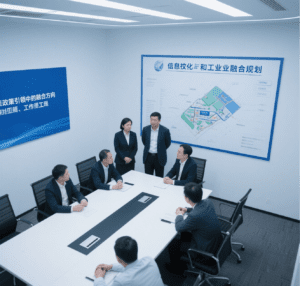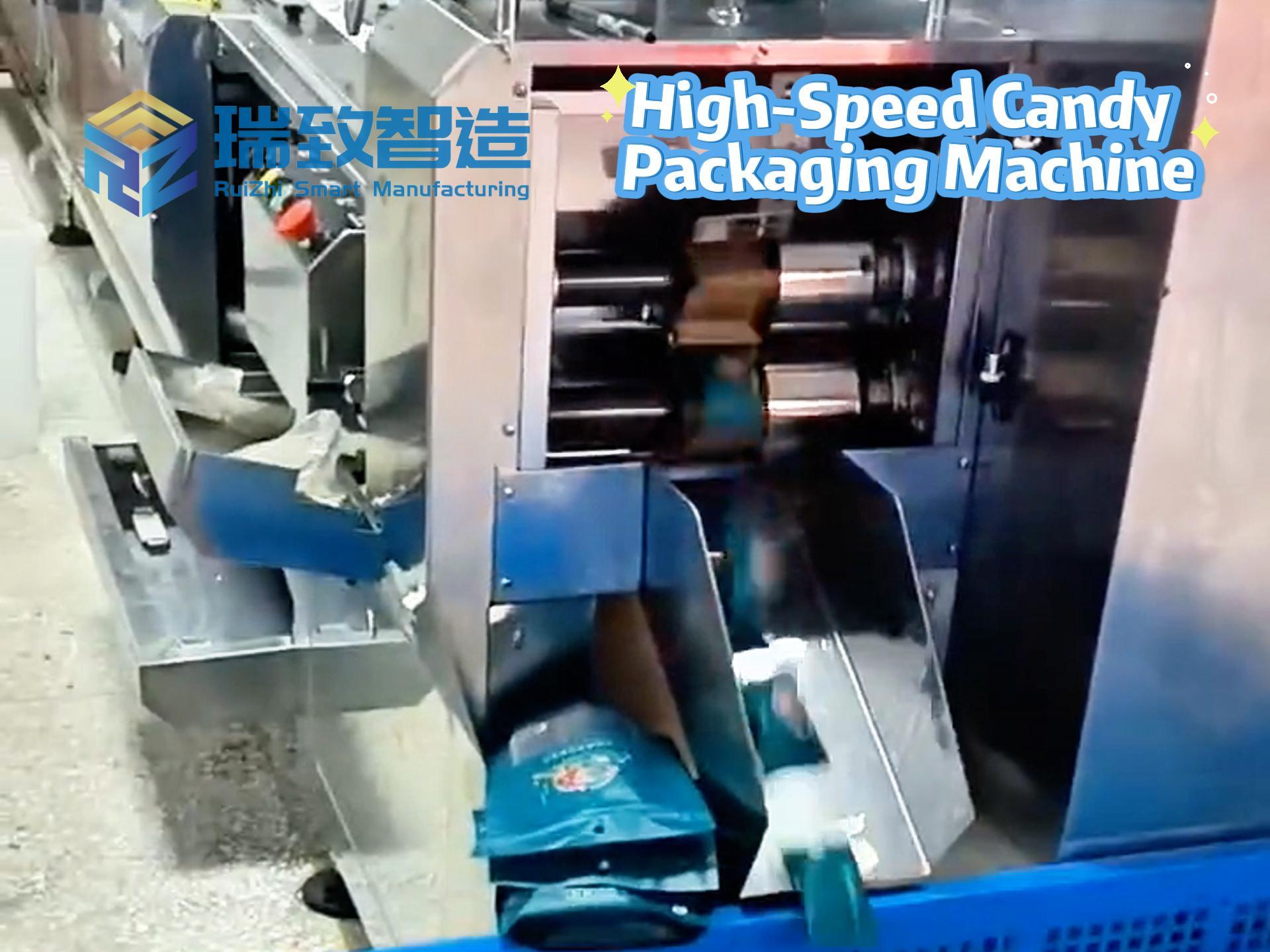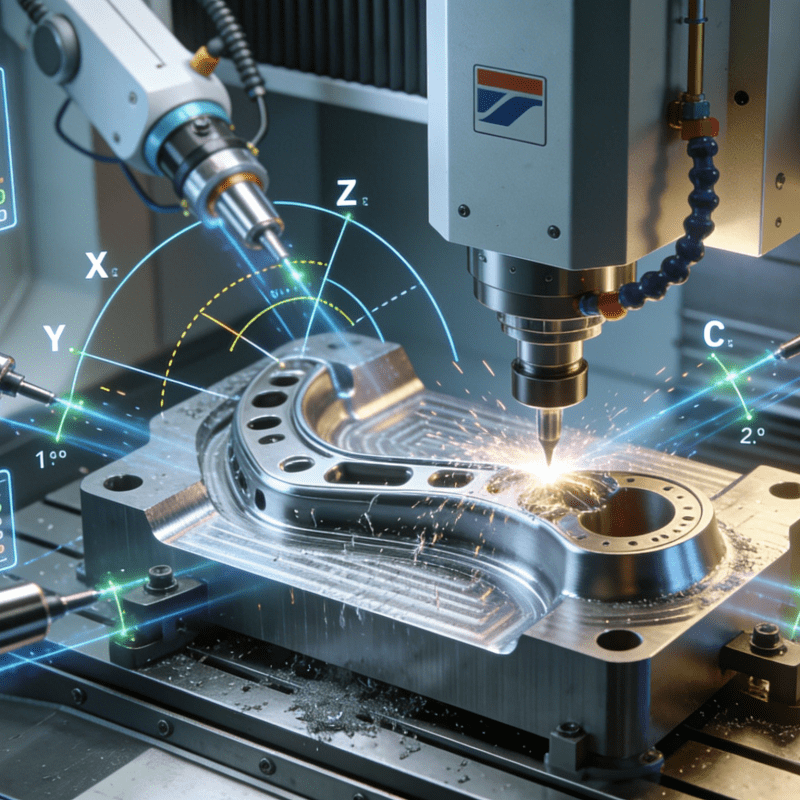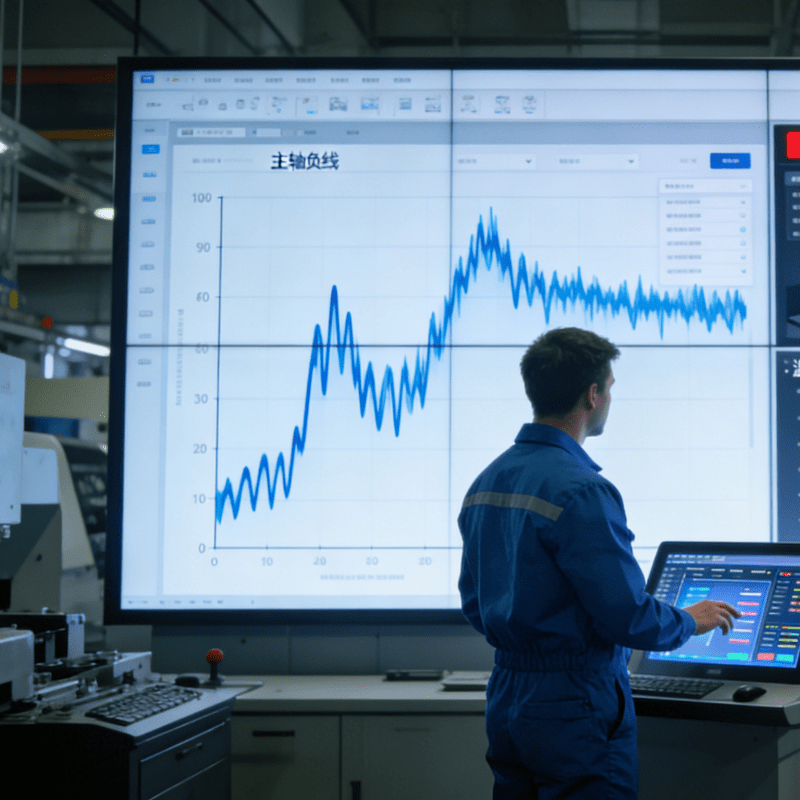Guide: Integrate the concept of integration of informatization and industrialization (IIoT) into all aspects of industrial and information technology work, systematically advance key tasks such as digital transformation of manufacturing, AI-enabled new industrialization, digitalization of small and medium-sized enterprises (SMEs), intelligent manufacturing projects, and industrial internet. Embody the promotion of integrated development in specific tasks such as formulating policies and standards, implementing industrial plans, and deploying major projects.
Adhere to the guidance of Xi Jinping Thought on Socialism with Chinese Characteristics for a New Era, thoroughly implement the spirits of the 20th National Congress of the Communist Party of China and the Second and Third Plenary Sessions of the 20th Central Committee, and implement the decisions of the Central Economic Work Conference and the National Conference on Promoting New Industrialization. With new industrialization as the key task, new productive forces as the main direction, and reform and innovation as the fundamental driving force, we will improve the system for advancing IIoT, seize the opportunity of AI transformation, accelerate the full-scale and full-chain popularization and application of a new generation of information technology. We will take IIoT as a strategic task and specific practice to promote new industrialization, use integration to boost development and innovation, and push the integration of informatization and industrialization to a broader scope, deeper level, and higher level, providing strong support for steadily advancing new industrialization and accelerating the building of a manufacturing power and a cyber power.
Table of Contents
ToggleI. Improve the System for the Development of Integration of Informatization and Industrialization
(1) Strengthen the leadership mechanism for IIoT. Integrate the concept of IIoT into all aspects of industrial and information technology work, systematically advance key tasks such as digital transformation of manufacturing, AI-enabled new industrialization, digitalization of SMEs, intelligent manufacturing projects, and industrial internet. Embody the promotion of integrated development in specific tasks such as formulating policies and standards, implementing industrial plans, and deploying major projects. Adjust and establish an IIoT Work Leading Group, convene its first meeting, and study and deploy ideas and measures for advancing IIoT in the new journey.
(2) Improve the policy system for IIoT. Implement the goals and tasks of the 14th Five-Year Plan, formulate a high-quality 15th Five-Year Plan for IIoT development, clarify work concepts and collaborative relationships in the field of IIoT, and guide governments, enterprises, universities, and research institutions to identify the path and key priorities for integrated development. Promote the release of policy documents such as the Guiding Opinions on High-Quality Development of Industrial Internet, the Action Plan for High-Quality Development of Industrial Internet Platforms, and the Implementation Opinions on Data Elements Enabling New Industrialization. Coordinate the use of policies such as “Two New Initiatives” and “Two Major Projects” to promote equipment renewal, process upgrading, digital empowerment, and management innovation in key industries.
(3) Continuously expand industrial evaluation and monitoring. Further clarify evaluable, assessable, and quantifiable development goals for IIoT, improve mechanisms for monitoring, analysis, performance evaluation, and supervision of IIoT development, and strengthen tracking and analysis of the IIoT level of industries. Establish and improve an evaluation system for IIoT development level, and propose overall indicators characterizing the degree of IIoT based on the evaluation foundations of key tasks in various industries and fields. Strengthen coordination and data conversion for existing evaluation work on IIoT level, intelligent manufacturing maturity, and digitalization level of SMEs. Issue the General Evaluation Index System for Digital Transformation of Manufacturing (Trial), and uniformly collect digital transformation data of industrial enterprises above designated size based on the Comprehensive Information Service Platform for Digital Transformation of Manufacturing.
II. Consolidate the Foundation for IIoT Development
(4) Consolidate basic guarantees for integrated development. Increase investment in 5G evolution and 6G technological innovation, promote the construction of industrial 5G independent private networks, and implement the upgraded plan for the “Sailing” Action for large-scale application of 5G. Organize the “Cracking Key Problems” Initiative for Computing Power, steadily optimize the layout of computing power centers, and deepen the integration and application of computing power with industries. Promote high-quality development of industrial internet platforms, study the gradient cultivation mechanism for industrial internet platforms, and improve the functional system for networks, identifiers, platforms, data, and security. Build an upgraded version of the “5G + Industrial Internet” 512 Project, and support qualified cities in building pilot cities for “5G + Industrial Internet” integrated applications.
(5) Deepen research on key integration technologies. Support high-quality development of basic software and industrial software, organize “Open Bidding” for AI-enabled new industrialization, and strengthen the R&D layout of general large models and industry-specific large models. Encourage R&D and promotion of industrial intelligent agents for typical scenarios, support a number of enterprises in pilot construction of intelligent agents, and improve the intelligence level of the entire industrial process. Support R&D of industrial intelligent technologies and formulate a technical system map for industrial intelligence.
(6) Enhance the supply of industrial data elements. Accelerate data elements to empower new industrialization, and promote data to become resources, assets, and elements. Promote the construction of a product master data standard service platform and accelerate the improvement of data standardization. Promote the enterprise chief data officer system. Build a secure and trusted industrial data space to efficiently develop, construct, and maintain data resources. Establish a number of high-quality industry data sets, promote the upgrading and optimization of industrial data algorithm models, basic technical components, and application components, explore the establishment of industrial data circulation and transaction mechanisms, and improve the efficiency of industrial data collection and interconnection. Organize the collection of typical practice cases of data element application scenarios in the industrial field and release application scenario guidelines.
(7) Cultivate digital universal solutions. Select a number of digital universal tool products with strong universality and high standardization, and vigorously cultivate high-quality software and hardware products at low cost. Study and build a testing and certification system for digital transformation universal tool products, and develop standards such as technical requirements and testing specifications for universal tool products. In response to the needs of digital transformation and intelligent upgrading in key industries such as raw materials, high-end equipment, consumer goods, and electronic information, carry out “Open Bidding” for intelligent manufacturing system solutions.
III. Strengthen the Empowering Application of Information Technology
(8) Promote digital transformation. Continue to carry out pilot cities for new technological transformation of manufacturing and digital transformation of SMEs, and guide industrial enterprises above designated size and specialized, sophisticated, distinctive, and novel SMEs to accelerate digital transformation. Implement the digital transformation plan for key industries, compile and release scenario-based and map-based reference guidelines for advancing digital transformation of key industries, promote key industries to carry out transformation diagnosis and upgrading based on digital transformation scenario maps, and collect and select a number of typical experiences and practices. Cultivate a number of scenario-based digital transformation solution providers focusing on data value mining, equipment renewal and transformation, and process optimization. Improve the service system for digital transformation of manufacturing, and carry out classified and graded evaluation of digital transformation service providers for manufacturing. Issue the Guidelines for Establishing Digital Transformation Promotion Centers for Manufacturing and build digital transformation promotion centers for manufacturing. Promote industrial enterprises and parks to build a number of digital energy and carbon management centers to achieve precise measurement, refined management, intelligent decision-making, and visual presentation of energy consumption and carbon emissions. Select and promote a number of typical cases of “Digital Three Products” application scenarios, and accelerate digital integration applications in the consumer goods industry.
(9) Promote networked collaboration. Accelerate the construction of new industrial networks, promote integrated networking of various industrial wireless and wired network technologies such as 5G, industrial optical networks, industrial Ethernet, and Time-Sensitive Networking (TSN), and encourage enterprises to accelerate internal and external network transformation. Implement the “Connection” Action for identifiers and the “Chain-Network Collaboration” Project for industrial internet and key industrial chains. Promote large-scale application of industrial internet in industries such as electric power, construction machinery, electronics, equipment manufacturing, and automobiles, accelerate in-depth integration and two-way empowerment of industrial internet and AI, and collect typical cases of “Chain-Network Collaboration”. Explore and promote a number of typical cases of new models and formats based on industrial internet, such as digital management, intelligent manufacturing, networked collaboration, personalized customization, service-oriented extension, and platform-based design.
(10) Improve the level of intelligence. Compile guidelines for AI applications in manufacturing enterprises, and strengthen in-depth integration and application of AI technologies in the industrial field. Implement the “AI + Manufacturing” Action, and support enterprises in applying general large models, industry-specific large models, and intelligent agents in key scenarios. Further implement the Intelligent Manufacturing Project, continue to carry out the gradient cultivation action for smart factories, and study and formulate interim measures for the management of gradient cultivation of smart factories. Rely on the construction of smart factories to drive the accelerated application and iterative upgrading of innovative achievements in intelligent manufacturing equipment, industrial software, and system integration.
(11) Guide transformation and upgrading of industrial chains and clusters. Further implement the Action for High-Quality Development of Key Manufacturing Industrial Chains. Study and launch the World-Class Cluster Cultivation Project, and promote the construction of a number of high-standard digital parks for key clusters and parks. Continue to implement the “Hundred Cities and Thousand Parks” Initiative for industrial internet integration into parks, and accelerate large-scale construction and application of new infrastructure in key parks. Support qualified regions in carrying out pilot projects for digital supply chain standardization, and accelerate the construction of an efficient, flexible, and controllable digital supply chain system.
IV. Improve the Construction of IIoT Standard System
(12) Promote collaborative supporting of IIoT standards. Strengthen work guidance for standardization technical organizations such as the National Technical Committee for Integration of Informatization and Industrialization (TC573) and the National Technical Committee for Information Technology (TC28), further give play to the role of the National Intelligent Manufacturing Standardization Leading Group and the National Industrial Internet Standard Leading Group, build a collaborative supporting mechanism among standard systems such as digital transformation, intelligent manufacturing, and industrial internet, and strengthen standard adoption and reference among various standard systems. Deepen international standardization work, focus on fields such as digital transformation of manufacturing, industrial large models, data governance and application, and industrial software, and initiate a number of international standards in international standardization organizations to enhance discourse power in international standards.
(13) Accelerate the application and promotion of mature standards. Iteratively optimize the IIoT standard system, compile and release the Guidelines for the Construction of Digital Transformation Standard System for Manufacturing, and strengthen guidance for standardization work in digital transformation of manufacturing. Promote the formulation and revision of a number of standards in fields such as industrial internet, digital supply chains, digital management of equipment, industrial data, industrial software, and industrial operating systems. Further expand the coverage of certification for the upgraded version of the IIoT management system, digital transformation certification, and data management maturity certification, and steadily improve enterprises’ digital capabilities.
V. Cultivate a Collaborative Development Ecosystem for IIoT
(14) Improve service carriers for integrated development. Promote public service carriers such as the National Industrial-Financial Cooperation Platform, the IIoT Public Service Platform, and the National SME Digital Transformation Service Platform to improve functions and enhance empowerment, providing enterprises with policy interpretation, diagnosis and evaluation, supply-demand matching, and talent training.
(15) Increase financial support. Guide industrial funds to increase support for technical products and solutions with independent intellectual property rights in the field of IIoT. Promote national industrial-financial cooperation pilot cities to deepen practical exploration and guide financial resources to tilt toward the field of IIoT. Implement the “Integration of Science, Technology, Industry, and Finance” Special Project to guide social capital to increase investment in hard technology projects in the field of IIoT development.
(16) Strengthen cultivation of technical and skilled talents. Continue to promote the construction of national outstanding engineer practice bases, build an industrial and information technology brand for outstanding engineer education, and promote the matching of supply and demand for digital talents. Carry out research on talent demand forecasting in the field of IIoT, increase efforts to introduce high-level overseas talents, further implement the manufacturing talent support plan, and gradually expand the team of high-level talents. Hold the National Industrial and Information Technology Skills Competition, set up events around digital transformation of manufacturing, and cultivate and discover a number of technical and skilled talents.
- Promote high-end exchange activities. Organize IIoT training courses and related competitions, strengthen policy publicity and guidance on methods and paths, build industrial consensus, and promote experience exchange. Organize scenario-level precise supply-demand matching activities for key industries, industrial clusters, and industrial parks. Actively participate in activities of the BRICS New Industrial Revolution Partnership Advisory Group and the Industrial Digitalization Working Group, and hold events such as the Digital Industry Ecosystem Sub-Forum of the 2025 BRICS New Industrial Revolution Partnership Forum. Deepen international exchanges in enterprises, products, standards, and talents, and promote the “going global” of outstanding IIoT practices.





















